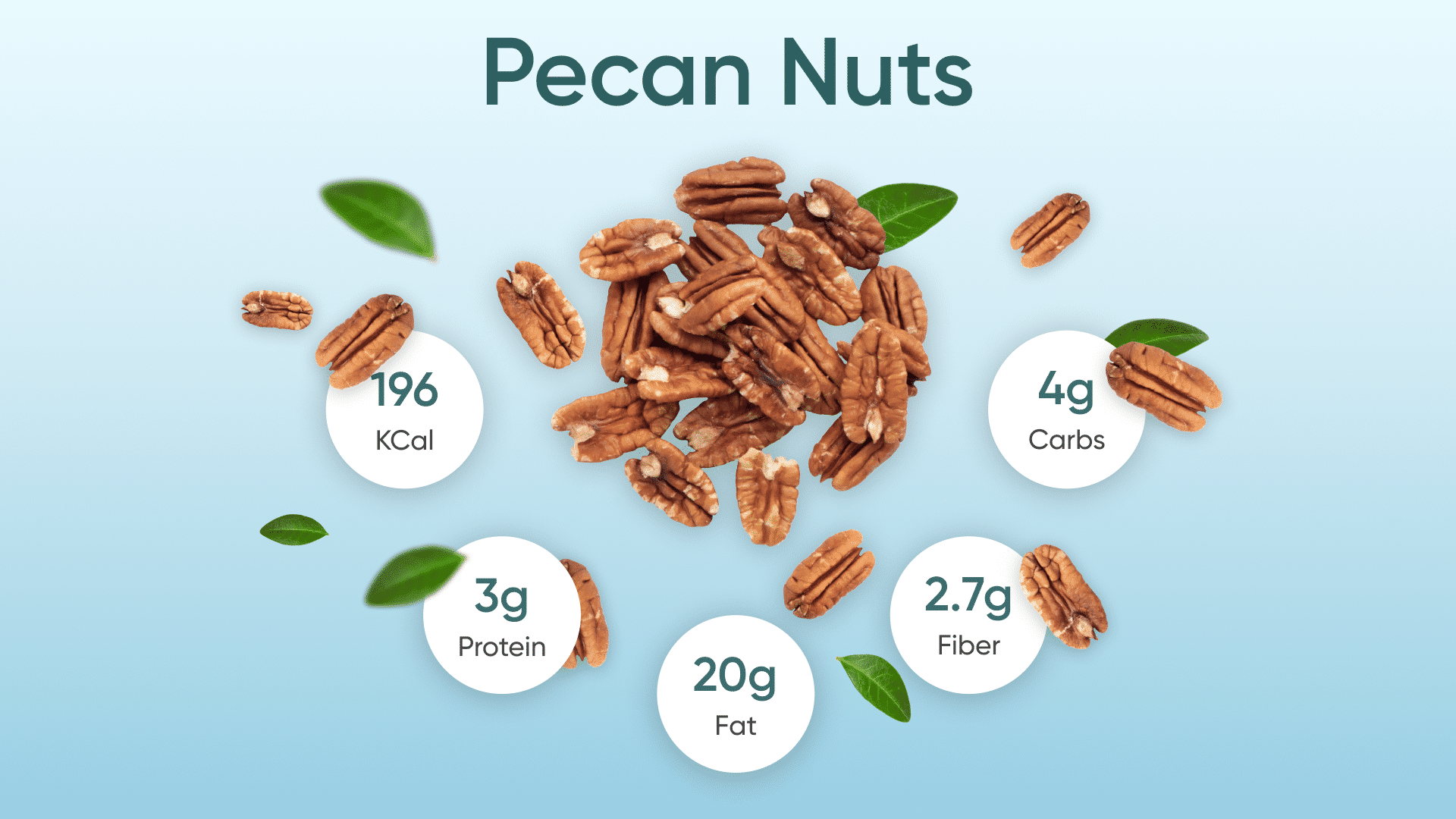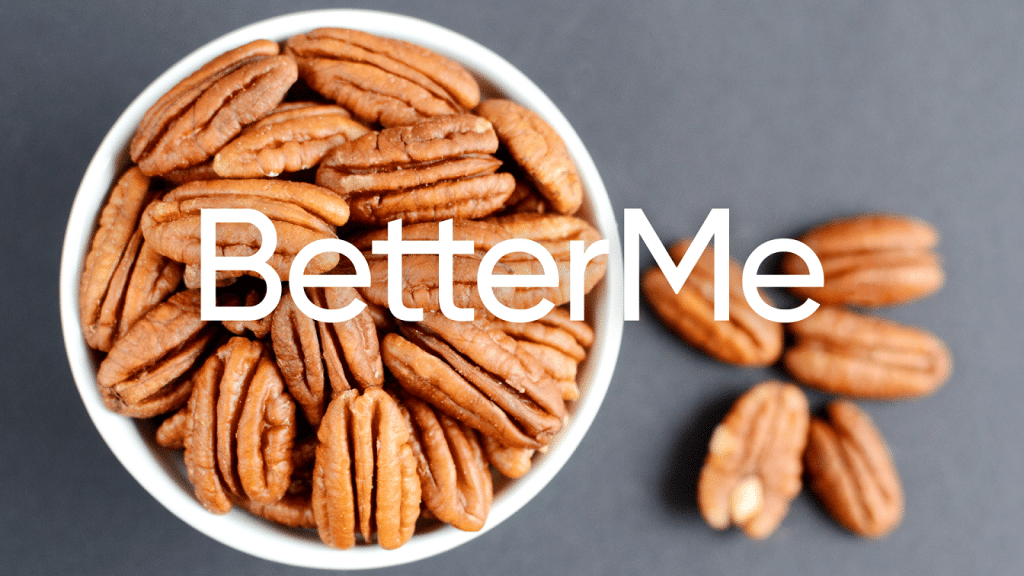There are several reasons why pecans are considered a national treasure trove of nutrients. They are loaded with vitamins, minerals, antioxidants, protein, fiber, healthy fats, omega-3 fatty acids and many more nutrients. All these nutrients contribute to the extensive list of the health benefits of pecans. So join us as we explore some of the most common benefits of adding these delicious nuts to your diet.
Pecans Nutrition Facts
One of the most delicious types of nuts is pecans. That’s a given. Besides being very tasty, these nuts are also loved for their nutritional value. They contain nutrients that result in the varying nutritional benefits of pecans. For example, these nuts have the following nutrients and benefits (5):
- Iron. Iron performs several roles in the body, but most importantly, it helps transfer oxygen from your lungs to the body tissues. Other functions include maintaining a healthy pregnancy, reducing the risk of premature birth and low birth weight, boosting athletic performance, and prevention against anemia.
- Magnesium. Magnesium supports a healthy immune system, bone health, and the maintenance of a steady heartbeat and normal nerve and muscle function.
- Phosphorus. This nutrient helps in the formation of teeth and bones. It is also responsible for the growth, maintenance and repair of body cells and tissues (6).
- Potassium. Potassium has several roles in your body. It helps in the movement of nutrients into your cells and removes waste products from your cells. It is involved in muscle contraction. It also helps in maintaining fluid and electrolyte balance in your body.
- Zinc. Zinc is required for your body’s immune functioning, cell division, wound healing, carbohydrates breakdown, and cell growth (8).
- Manganese. Manganese plays a role in carbohydrate metabolism, blood clotting, blood sugar regulation, calcium absorption, and the formation of bones, sex hormones, and connective tissues.
- Selenium. Traces of selenium in pecans help with immune system functioning, thyroid hormone metabolism, DNA synthesis, and improved cognition (7).
- Niacin (Vitamin B-3). Niacin is one of the B vitamins that keep your nervous system, skin, and digestive system healthy. It is also required by your body to convert food into energy.
- Choline. Choline helps with various body functions like the formation of cell membranes and the maintenance of good communication between neurons.
- Vitamin C. This vitamin is required for the growth and repair of body cells. It is also used in wound healing and the formation of skin, blood vessels, tendons, and ligaments.
By looking at the nutritional benefits of pecans, you can see that these nuts are packed with a ton of nutrients. In addition, pecans also have decent traces of other nutrients like folate, vitamin B-6, riboflavin, copper, fluoride, and pantothenic acid.
Even so, most people are curious about the number of carbs in pecans. The carbohydrate content may vary depending on the serving size. The same case applies when it comes to calories in pecans. The figure will also vary depending on the portion size or serving.
Read More: Cashew Nuts Facts, Calories, Health Benefits And Side Effects
To better understand the differences, let us look at two different pecan servings alongside their nutritional information. A 100-g serving of pecans has the following nutrients according to the United States Department of Agriculture (USDA) (5):
- Calories- 691
- Protein- 9.17 g
- Total fat- 72 g
- Carbs- 13.9 g
If you compare these nutrients with those in a one-ounce serving, the nutritional information will change. According to WebMD, the nutritional information of a one-ounce serving of pecans is as follows (2):
- Calories -196
- Total fat- 20 g
- Protein- 3 g
- Carbs- 4 g
Understanding the nutritional information of any serving is paramount as it gives you a better picture of the % DV of the nutrients you are consuming. As a result, you can estimate or calculate if that food is high or low in that individual nutrient compared to the amount you must consume daily.
Health Benefits Of Pecans
Adding pecans to your diet has been linked to several health benefits. Although many of them are associated with the general advantages of consuming nuts, some are specific to pecans. Take a look at the following health benefits of pecans:
-
Better Heart Health
Recent studies reveal that having a handful of pecans can be good for your heart. A study was conducted at the Jean Mayer USDA Human Nutrition Research Center to dig deeper into the link between pecans and heart health.
The study used 26 healthy yet overweight or obese men and women to study the effects of adding pecans in their diet for four weeks. There was also a control group that was also investigated over the four weeks. After four weeks, the groups switched diets – this is called a crossover study design.
The diets for both groups had low fiber, vegetables, and fruit count (a typical American diet). However, the calorie content, carbs, and total fat levels were kept constant – the intervention diet just had 15% of total calories replaced by pecans (1). After the study ended, it was found that the pecan-rich diet improved markers of insulin sensitivity (1).
Want to build an attention-grabbing bubble butt, blast away fat that’s stored in all the wrong places, spring-clean your diet, turn back the clock on your skin, skyrocket your self-confidence and shatter your insecurities? Check out the BetterMe app and set this plan in motion!
How Does Insulin Sensitivity Affect Heart Health?
Insulin sensitivity affects your heart and blood vessels in several ways. First, it leads to high blood sugar levels which cause inflammation, which damages the lining of your arteries. This makes it easier for fatty plaques to build up which can block your arteries and cause problems with blood flow, leading to heart-related conditions like stroke and heart failure. The main symptom of clogged arteries is angina (chest pain) (4).
Secondly, insulin sensitivity may cause weight gain. Being obese or overweight increases your risk of heart-related conditions like heart failure (4). This is because it puts strain on your heart, which eventually means your heart may have a hard time pumping blood, leading to breathing problems and fluid retention in your lungs and legs (4).
Experts also acknowledge that eating pecans boosts heart health due to their nutritional value. According to WebMD, pecans are rich in magnesium, calcium, potassium, and monounsaturated fat (2).
How Do The Nutritional Value Of Pecans Boost Heart Health?
The magnesium, potassium, and calcium in pecans can help in lowering your blood pressure. High blood pressure or hypertension damages your arteries by reducing their elasticity (3). As a result, there is a decreased oxygen and blood flow to your heart, leading to heart disease (3).
The decreased blood flow is responsible for the main symptom of heart disease, which is angina. Besides eating pecans, you can also manage or reduce your blood pressure by making various lifestyle changes. For example, you can quit smoking and/or exercise for at least 150 minutes weekly (3).
Similarly, the monounsaturated fats in pecans and other nuts help reduce LDL “bad” cholesterol levels in your body. By keeping these levels low, you have a reduced risk of experiencing a stroke or a heart attack (2).
-
Disease Prevention
Consuming pecans may also help in reducing the risk of several diseases due to some of the nutrients they contain. For example, these nuts have zinc and vitamins A and E that support your immune system and help fight infections (2).
Similarly, pecans also contain folate that protects your DNA against cancer-causing agents. Lastly, these nuts have antioxidants that may protect you from cell damage causing cancer, Parkinson’s and Alzheimer’s disease (2).
Read More: Macadamia Nuts Facts, Calories, Health Benefits And Side Effects
-
Diabetes Management
The other benefit of eating pecans significantly helps people with diabetes. Most people with diabetes are advised to consume foods that help ease or stabilize blood glucose levels. One of such foods is pecans.
These simple nuts have a low glycemic index, meaning they do not cause a spike in your blood sugar, even in individuals with diabetes (2). Experts also reveal that eating pecans alongside foods that trigger a high glycemic response can help reduce this effect (2).
-
Arthritis Relief
Eating pecans might also help in easing arthritis pain by reducing inflammation (2). Arthritis is a disease that affects your joints and involves degeneration or inflammation of your joints. These changes result in pain around your joint area whenever you use them.
This is commonly experienced in the feet. Pecans have been found to contain several nutrients that can help in easing inflammation and alleviating arthritis pain. For example, these nuts have omega-3 fatty acids that reduce inflammation and help relieve arthritis pain.
Similarly, pecans have fiber, magnesium, zinc, calcium, and vitamin E, giving them their anti-inflammatory properties and help with arthritis pain relief.
When it comes to weight loss, progress is made by inches, not miles, so it’s much harder to track and a lot easier to give up. BetterMe app is your personal trainer, nutritionist and support system all in one. Start using our app to stay on track and hold yourself accountable!
Side Effects Of Pecans
Despite the long list of benefits associated with eating pecans, you still need to watch your portions because they are high in calories. So, consuming many of these nuts may result in a calorie surplus, leading to unwanted weight gain.
Similarly, if you eat too many pecans you may become bloated or have gas and digestive issues. These occur from various compounds found generally in nuts like phytates. You may also experience diarrhea, vomiting, and dizziness if you overeat these nuts for a short duration.
To avoid all these, WebMD suggests you consume only a one-ounce pecan serving. This amount is equivalent to a quarter cup or 19 pecan halves (2). You can easily snack on these instead of potato chips as they are a healthy option, and will provide a satisfying feeling and energy that will keep you going until your next meal.
The Bottom Line
Pecans are healthy nuts that have several health benefits. For example, they may help boost heart health, reduce disease risk, alleviate arthritis pain and help with diabetes management. Even so, make sure you consume only one 1-ounce serving, as more may lead to weight gain and complications like diarrhea and bloating. Talk to your doctor and nutritionist also before adding these nuts to your diet plan.
DISCLAIMER:
This article is intended for general informational purposes only and does not address individual circumstances. It is not a substitute for professional advice or help and should not be relied on for decision-making. Any action you take upon the information presented in this article is strictly at your own risk and responsibility!
SOURCES:
- Can pecans protect heart health? (2018, medicalnewstoday.com)
- Health Benefits of Pecans (2020, webmd.com)
- High Blood Pressure Symptoms and Causes (2021, cdc.gov)
- Insulin Resistance and Your Heart (2020, webmd.com)
- Nuts, pecans (2019, fdc.nal.usda.gov)
- Phosphorus in diet (2021, medlineplus.gov)
- Selenium: What it does and how much you need (2021, medicalnewstoday.com)
- Zinc in diet (2021, medlineplus.gov)
















